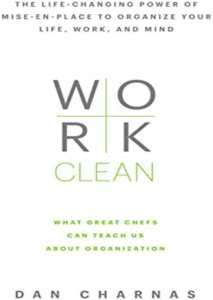Work Clean
Written By: Sydney Grierson
“Mental mise-en place is the idea that students can’t master physical organization without first organizing their minds.” – Dan Charnas

work clean
If you’ve ever watched Food Network, you’ve likely heard chefs talk about the importance of mise-en place. In the culinary world, this refers to the preparation and organization of tasks that chefs must do in order to ensure a smooth and perfect service for guests. This same principal is also used in recruiting.
Our team dove into the purpose, process, and practice of recruiting mise-en place through reading the book Work Clean by Dan Charas. Examples of subjects examined include planning, slowing down to speed up, calling and callback, inspecting and correcting, and cleaning as you go. One of my favorite takeaways from this book was the importance of “doing the work before the work” and how it can positively impact overall success from production, mental health, and client- and candidate-relationship standpoints.
For instance, let’s look at the topic of planning. As a recruiter, it can be easy to want to rush into a new position that we are excited about. Right after looking at the job description, we might already have a list of great candidates we want to call for the role. Or we might even think we’re ready to jump into a call. But in reality, there are many factors that need to be taken into account before any action can be taken.
We need to plan. And that doesn’t mean just planning for this role. It also means that we need to do our due diligence by examining plans that we already put in place and strategically determine where, or if, this new role fits in. Do we have the capability to be flexible right now? Have we already committed to other internal / external projects that need our focus? And we also need to determine if the role is ready to be worked on. Do we know why it is open and if the organization has any urgency to fill the position? Is there any information on a compensation range? Will candidate relocation or sponsorship be considered?
With this insight in mind, we can determine whether or not to work on the position due to personal or position time frame; prior commitments; and missing, pending, or available information from the hiring team.
- Important and urgent – considering working on the role after weighing out against other obligations
- Important but not urgent – consider working on the role after other obligations are done
- Not important but urgent – determine what else needs to be found out to make the position important and gain insight from company before committing
- Not important and not urgent – hold off on working on the role / request and revisit timeline and insight once received
It’s also important to note that planning can positively impact one’s mental health. Impulsive behavior can cause projects and plans to go completely off track. When this happens, productivity and opportunities to see things through disappear. Staying focused, planning, and being less reactive creates an atmosphere that is less stressful and more fulfilling when we see complete tasks and commitments. As recruiters, it is our responsibility to stay focused and committed, which is all possible through concepts such as mise-en place.


